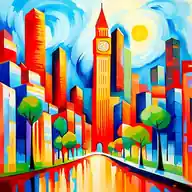
Top 10 Must-See Attractions in Jaipur, Rājasthān, India
1. Hawa Mahal
A five-storied palace with 953 small windows, Hawa Mahal is a symbol of Rajputana architecture. Its unique design provides a cool breeze, making it an appealing attraction.
- Historic Significance: Built in the 18th century for royal women to watch processions.
- Architectural Marvel: Combines Rajput and Mughal architectural styles.
- Cool Breeze Spot: Provides a natural breeze, even in the hot summer months.
2. City Palace
A complex of courtyards, gardens, and buildings where the Maharaja still resides. It showcases a blend of Mughal and Rajput styles.
- Royal Residence: Currently serving as the residence of Jaipur's royal family.
- Museum: Houses a museum showcasing royal costumes, weapons, and paintings.
- Architectural Diversity: Features a mix of Indian classical, Mughal and Rajput architectural styles.
3. Jantar Mantar
A collection of astronomical instruments built by Maharaja Jai Singh II in the 18th century. It is a UNESCO World Heritage Site.
- Historical Importance: Constructed for astronomical observations and predictions.
- Unique Architecture: The largest sundial in the world, Samrat Yantra, is found here.
- Scientific Significance: Provides accurate astronomical measurements even today.
4. Amber Fort
An ancient fort situated on a hill overlooking Maota Lake. It is a beautiful blend of Mughal and Rajput architecture.
- Historical Significance: Built in the 16th century by Raja Man Singh.
- Scenic Views: Offers panoramic views of Maota Lake and the city below.
- Royal Experience: Explore the fort on an elephant ride for an authentic royal experience.
5. Jaigarh Fort
A hilltop fortress constructed by Jai Singh II. It houses the world's largest cannon on wheels, Jaivana.
- Historical Significance: Constructed for defense purposes.
- Military Artifacts: Houses the world's largest cannon on wheels, Jaivana.
- Scenic Views: Offers stunning views of the city and Amber Fort.
6. Nahargarh Fort
A fortress built by Maharaja Jai Singh II to strengthen the defense of Jaipur. It offers a beautiful view of the city during sunset.
- Historical Significance: Constructed in the early 18th century.
- Scenic Sunset Views: Offers a picturesque view of the sunset over Jaipur city.
- Royal Residence: Used as a royal residence until the late 19th century.
7. Galtaji Temple
An ancient Hindu temple complex with natural springs. Known as the 'Monkey Temple' due to the large number of monkeys.
- Historical Significance: Built in the 18th century by Maharaja Sawai Singh.
- Natural Springs: Features seven sacred natural springs.
- Monkey Population: Home to a large population of monkeys.
8. Birla Mandir
A modern Hindu temple built in the 20th century. Known for its white marble structure and intricate carvings.
- Modern Architecture: Built using white marble in the 20th century.
- Carved Detail: Features intricate carvings depicting Hindu scriptures and deities.
- Peaceful Atmosphere: Provides a tranquil atmosphere for visitors to meditate and seek peace.
9. Chokhi Dhani
An ethnic Rajasthani village resort that offers a glimpse into rural Rajasthan's culture and traditions.
- Cultural Experience: Provides an immersive cultural experience in a replicated traditional Rajasthani village.
- Food and Dance: Offers traditional Rajasthani cuisine, folk dance performances, and camel rides.
- Handicrafts Market: Features a market selling traditional Rajasthani handicrafts and jewelry.
10. Central Park
A large park in the heart of Jaipur that offers a peaceful escape from the city's bustle.
- Green Space: Provides a much-needed green space in the city.
- Recreational Facilities: Offers facilities for jogging, cycling, and other outdoor activities.
- Cultural Events: Hosts cultural events and concerts throughout the year.
